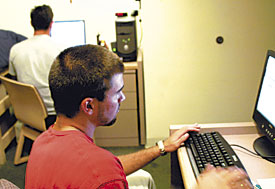 |
|
JOSHUA SILLS/Arizona Daily Wildcat
|
Chris Huffman, an undeclared freshman received the Welchia worm on their dorm room computers in La Paz Hall.
|
|
|
By Dana Crudo
Arizona Daily Wildcat
Friday August 29, 2003
Residence halls might be forced to shut down network connections to specific students who do not take actions against the computer viruses that have been plaguing susceptible computers.
Blaster and SoBig are the two main culprits, with SoBig being the fastest spreading virus ever recorded, affecting Microsoft Outlook, Outlook Express, and Web-based e-mail programs. Blaster affects Microsoft Windows NT, 2000, and XP.
The Blaster takes advantages of vulnerabilities in Windows, which Microsoft warned customers against in July, yet many people never downloaded the patches that were recommended.
The SoBig virus, which causes mass mailing, is received as an attachment in an email that looks safe.
Signs that an attachment might contain the virus include a short subject line or an absence of text.
Patches are created and dispersed by the company to help protect vulnerable systems from virus infection.
"It is not an intuitive process, people don't know to run updates on Windows," said Steven Gilmore, assistant director of Residence Life.
Even though there are patches and numerous other safety precautions provided to students, students are slow to take the necessary preventative measures, causing disruption in the network if their computer becomes infected.
"The viruses are under control with administration but students are plugging in computers that are infected, affecting the whole network," Gilmore said.
A week before the fall semester began, UA workstations were infected with the Blaster virus, which causes computers to reboot without user input.
Employees at the UA took steps to avoid more infections by detecting and destroying the virus in workstations, however UA cannot protect its computers from viruses that are brought in by computers outside the UA network.
All it takes is one infected computer to infect all of the computers in residence halls in a matter of seconds, Gilmore said.
"Right when I logged on, I got the virus, I was able to fix it in 10 minutes though," said Jessica Pittsley, nutritional sciences freshman.
Students have already experienced the disastrous effects the viruses can have on their computers.
"I got the Blaster worm; every time I signed onto the Internet I got kicked off in a matter of minutes. I got (the worm) because I hadn't updated my virus definitions," said Chris Huffman, undeclared freshman.
In order to help students out, residence halls were given CDs for residents to use in order to detect and destroy the Blaster and Welchia worms.
Welchia is a type of worm that affects the computer in the same way that the Blaster does.
If these CDs are not used, and infections continue to occur then UA will have to completely shut down connection networks to students, a step other universities around the country have already taken.
If UA does decide to shut down network connection, more tech people would be hired; yet doing so would require extra money. This means that money originally meant for residence hall events will have to be spent on paying tech workers to clean up students' computers.
Officials will give residents a few weeks to install the anti-virus CD on their computers. But after that they will be forced to take people off the network who haven't installed the protective patch.
However, all of this is preventable as long as students take the precautions that are recommended.
"Students with Windows NT, 2000, or XP should use the CD whether they think they have the virus or not," Gilmore said. "All students need to spend time maintaining their computers, Microsoft makes it really easy to do."
